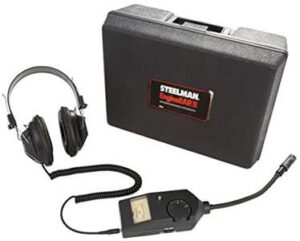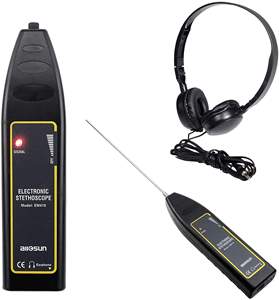
Purr, Hmm, Vroom. Latest technology and modern engineering has made driving a car easy on the ears. Well, there are some noises that may indicate trouble with your car.
So car savvy says that every once in a while you should roll down the windows and listen for any odd sound. In this short guide, we have provided a list of noises that are signs of any trouble in your car.
Car Making Noise When Driving
If your car is making noise while driving then it could be a wheel bearing that makes a bit of a noise that tends to get worse at certain speeds. Or it could be something like a water pump which is maybe more noticeable at driving around town speed. it also could be a possible leak somewhere or a fan belt.
Car Making Noise When Driving Slow
Why is your car making noises even at a low speed? Should it be making noises? What do these sounds mean? So many questions when you hear noises from a car accelerating slowly, right?
Well, some noises may be perfectly normal but some may indicate that there is something wrong with the car. Below is a list of noises that you should pay attention to.
Squeaking Sound
If your car is making a squeaking noise when driving slow, the first thing you will have to do is to examine the dust guard.
Some common causes of a squeaking noise could be worn-out brake pads, old spacers brake, backing plate touching the rotor or dirty brake pistons.
Clicks and Clunks Sound
A click and clunk sound can occur due to several reasons, such as sway bar bushings are cracked, the tire is loose, or CV (constant velocity axle) or half shaft is worn, but usually, it can be heard if a 14mm bolt on the CV gets loose.
Grinding Noise
If you hear a grinding noise, you must first check the wheel bearing because this sound is mostly heard if there is any problem with the bearings or brake. It may also be caused because of a contaminated joint or a torn axle boot.
Car Making Noise When Driving Fast
With an increase in the car’s speed, the noises that the car makes also start changing. Now, as we discussed some of the noises a car makes while it is moving slowly, in this section, it’s time to look at what noises a car makes when it is being driven at high speed.
Rumbling Noise
If you hear a rumbling sound from your car, this could be due to a rock, bubble, or nail in the tire, or it could be due to the alignment issue. One important thing that you have to note here is that rumbling noise from the car increases as the speed increases.
Rattling Noise
Another sound you can hear while the car is at a higher speed is rattling. This sort of sound indicates a problem with your vehicle’s vibrating exhaust or a broken bolt on the engine mount.
Whistling Noise
A whistling sound that increases with the car’s speed and is coming from below the hand brake area can be due to a problem with the windshield broken seal.
Flapping Noise
If you hear a flapping noise, there could be a crack under-car splash cover, a missing screw from the tire head, or a loose mud flap.
Car Making Noise when Driving Over 60mph
If you are driving a car at a speed of more than 60mph and hear a low ticking, then a possible cause would be problems associated with the driveshaft or timing chain.
However, if this noise increases with the speed and whooping sounds are heard, then either the wheel bearings are in poor condition, or there may be problems with brakes dragging or a vibrating CV joint.
Likewise, if you hear whistling at a speed of 60mph or more, it is a result of weather stripping or a gap in the headlight or bumper.
Loud Screeching
Your vehicle may produce a loud screeching noise if there is any problem with the alternator, power steering pump, or A/C compressor. If you hear this sound even after removing the power steering belt, you must tighten the alternator belt.
Car Making Noise When Driving but Stops When Braking
In such scenarios, the noise could result from several problems that include:
- Worn out brake pads
- Dirt or stone stuck in brake pads
- The metal tab on the side of the pads grinds against the disc
- One side of the pad may not retract from the disc after you apply the breaks
Car Making Noise When Driving Over Bumps
If you drive your car over a bump and you hear certain noises then it is time to take your car to a mechanic. Usually, a car will make two different sounds when driven over the bumps.
- A car rattling over bumps indicates a problem with sway bar bushings
- A car clunking over bumps is a result of a problem with either ball joints, bushings, or strut mount
Product Recommendations
Steelman EngineEAR: Its a Stethoscope Auto Diagnostics Tool with 60-120 Decibel Meter, Noise-Canceling Headphones and Non-Conductive Microphone. See the latest price here.
Allsun EM410 Electronic Stethoscope Car Noise Detector for Automotive/Industrial Machine/Household Appliance. See the latest price here.
Eight Common Noises a Car Makes
Usually, a car with different problems makes various noises depending upon the problem with the car. Here I would like to discuss the eight common noises made by a moving car.
Loud Screeching Noise from Car while Driving
Brake pads feature a built-in indicator that starts to squeak if your car’s pads are getting low. If the brake pads’ padding completely wears away, the metal backing starts to rub on the rotors and produce a grinding noise.
Therefore, if you hear any grinding or screeching, you must immediately go to a car mechanic to check your brake pads and brake rotors.
Chirping or Squealing Sound From the Engine Compartment
Such noises from the engine can either be constant or are only when you start your car in the morning, and such sounds occur if the belt is either loose or is worn out.
Many things in your car’s engine, such as an AC compressor, power steering pump, or alternator, are sometimes driven by a single belt known as a serpentine belt.
But mostly, individual components such as an alternator have their belt. To put it simply, if these belts get old, stretched, cracked, or too oily, then they start to slip and result in a chirping or squealing sound.
Groaning or Whining Sound from the Steering Wheel
Picture this: you are about to make a turn, and as you turn the steering wheel, you start hearing a weird groaning or whining sound from under the hood. This weird noise is usually because of a low power steering or an air leak in the system.
Now, this issue can be resolved in two different ways. Firstly, you can refill the power steering fluid if the power steering fluid is low. Secondly, you can replace the pump if there is an air leak.
Rumbling Sound When Driving on the Highway
Diagnosing the problem causing these sounds is extremely difficult. Usually, it is said that wheel bearings cause these noises.
Clicking Sound from Underneath the Car Upfront
A clicking sound paired with shaking or vibration in the steering wheel is because of a CV axle going bad. Moreover, this sound is usually heard when you are making slow left or right turns.
Clunking Sound When Driving Over Rough Roads or Bumps
Stabilizer links are the common reason for suspension noise, i.e., clunking noise. Diagnosing the problem causing a clunking sound is extremely easy and fixing is also the least expensive.
Buzzing or Rattling Sound at Different Speeds
Your car’s exhaust system is a combination of different elements such as the exhaust manifold at the engine, catalytic converter, muffler outback, etc.
All of these are protected by thin metal shields. The issue with these shields is that rocks can easily get inside them. As a result of these rocks, the shields can get bent, rust, and eventually fall apart. When these metal shields fall apart, you will hear loud buzzing sounds at different speeds.
Verdict
To conclude this discussion, I would say that if your car is making weird noises, then it is trying to tell you something, so if you hear any weird sound take the car to your trusted mechanic and have the issue fixed.
Related Article: Why is Car Making Noise When Starting


